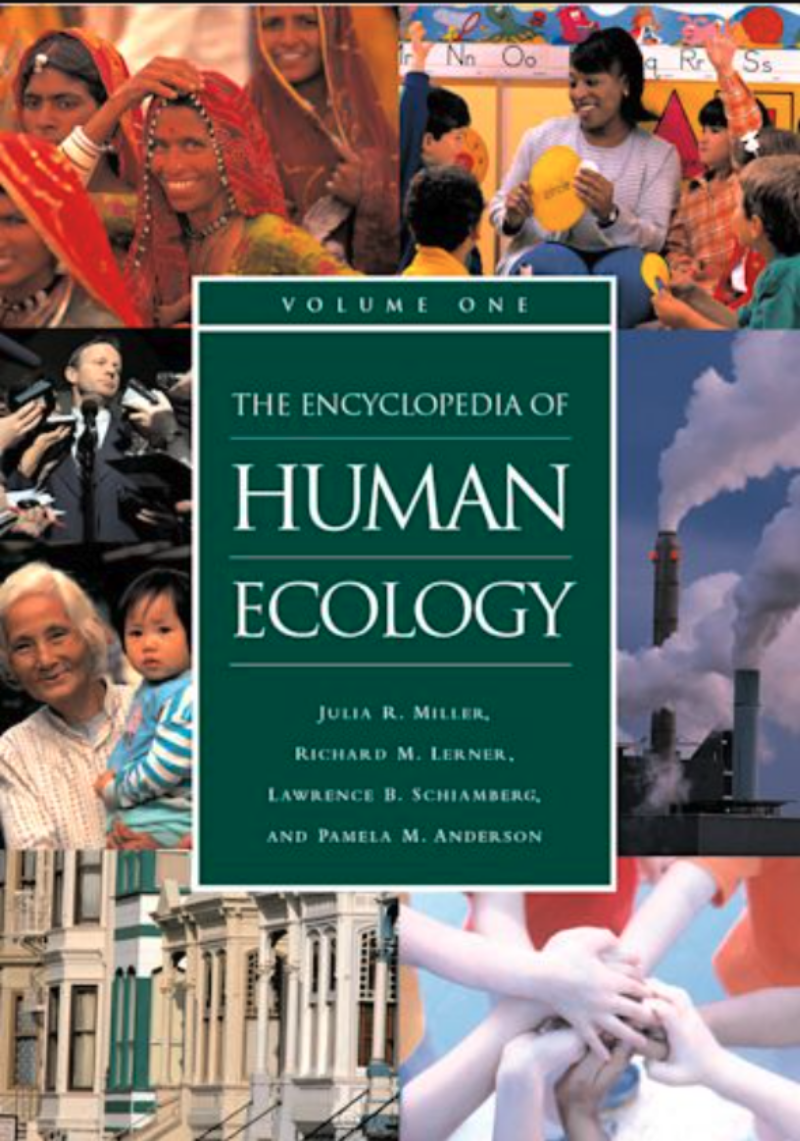Citation
King, P. E. (2003). Faith-based initiatives. In J. R. Miller, R. M. Lerner, L. B. Schiamberg, & P. M. Anderson (Eds.), The Encyclopedia of Human Ecology. Santa Barbara, CA: ABC-Clio.
Abstract
The first—and only—source to integrate the multiple disciplines and professions exploring the many ways people interact with the natural and designed environments in which we live.
Comprising more than 250 informative entries, The Encyclopedia of Human Ecology examines the interdisciplinary and complex topic of human ecology. Knowledge gathered from disciplines that study individuals and groups is blended with information about the environment from the fields of family science, geography, anthropology, urban planning, and environmental science. At the same time, professions intended to enhance individual and family life—marriage and family therapy, clinical psychology, social work, dietetic and other health professions—are represented alongside those concerned with the preservation, conservation, and management of the environment and its resources.
How rampant are eating disorders among our youth? Are AIDS educational programs effective? What problems do adolescents transitioning into adulthood encounter? Here, four leading scholars in the field have assembled a team of top-tier psychologists, sociologists, anthropologists, and other experts to explore these and hundreds of other timely issues.
Copyright
Year: 2003
Holder: Bloomsbury Publishing
DOI: https://www.bloomsbury.com/au/encyclopedia-of-human-ecology-9781576078532/
Continue Exploring

Spirituality
Religion as Fertile Ground
Abstract An extensive body of research points toward spirituality and religiousness as resources for promoting human thriving. People with strong connections to the transcendent and religious meaning in life often view morals and values as central to their self-concepts. Although moral identity theory and contemporary views of virtue development emphasize the importance of narrative identity for habituated moral action, the two are often discussed in isolation of each other. In this chapter, the authors highlight how their commonality is particularly evident when examining the potential of religion to provide a transcendent self-narrative that leads to virtue formation and moral action…

Gratitude
How diverse beliefs shape the experience of transcendent gratitude
Citation Nelson, J., Mangan, S., Baer, R. A., Ramdass, J. V., & King, P. E. et al. (2024). How diverse beliefs shape the experience of transcendent gratitude, The Journal of Positive Psychology, 19(1), 11-24. Abstract As a novel contribution, this study considers transcendent gratitude (e.g. gratitude towards non-human benefactors such as God, Science, or Karma) across diverse belief systems. The sample included 619 participants (M age 37.5, 52.6% female) across the U.S. with beliefs across three distinct categories: a) Theistic; 38.4%), b) Spiritual but not theistic; 26.4%, and c) Non-theistic/Non-spiritual (Other);…

Spirituality
Spiritual Formation in Theological Education: A Multi-case Exploration on Seminaries and Student Development
Citation Wang, D. C., Reed, A., Greggo, S., Bowersox, L., Drennan, A., Strawn, B., King, P. E., Porter, S. L., & Hill, P. C. (2023). Spiritual Formation in Theological Education: A Multi-case Exploration on Seminaries and Student Development. Christian Education Journal: Research on Educational Ministry, 20(1), 65–86. https://doi.org/10.1177/07398913231177722 Abstract In recent decades, theological schools have demonstrated increased interest in educational models that not only transmit knowledge and skill to students, but also prepare them to have the character and virtue dispositions needed to successfully navigate the moral challenges that await them in future ministry settings. This shift is reflected in…

